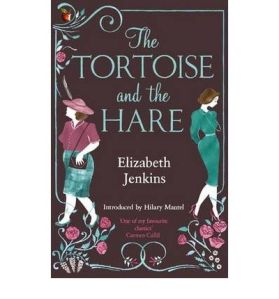‘The Tortoise and the Hare’ by Elizabeth Jenkins (1954) – 252 pages
One could make an entire literary career just by rediscovering excellent but overlooked English woman writers from the previous century. Elizabeth Jenkins was another fine writer who merits being highlighted. What fame she has mostly rests upon her twelve biographies including her 1958 biography of Elizabeth I, ‘Elizabeth the Great’. She also penned a biography of Jane Austen in 1938, was involved in the establishment of the Jane Austen Society, and worked to purchase Austen’s home in Chawton which later became the Jane Austen’s House Museum.
Besides the biographies, Jenkins also wrote twelve novels of which ‘The Tortoise and the Hare’ is perhaps the most noted. In the introduction to this novel, Hilary Mantel writes of Elizabeth Jenkins, “What she offers us does not date: descriptive grace and narrative pulse, dry humour and moral discrimination, tempered elegance and emotional force.”
‘The Tortoise and the Hare’ is the story of a love triangle with an unusual twist. It takes place in a well-to-do neighborhood of lawyers and doctors. After long years spent of education and apprenticeship in their twenties and early thirties, these professional men finally could marry, settle down, and live in a prosperous area. They would marry a young pretty trophy wife to go with their hard-won affluence. Only later would they discover that their trophy was somewhat tarnished when these men found they had nothing in common with their young wives and they could hardly talk to each other.
The novel is written from the perspective of 38-year-old Imogen Gresham, wife of 52-year-old lawyer Evelyn. They and their 11-year-old son Gavin live in a fine estate. With the fourteen years difference in age between husband and wife, Imogen is one of these beautiful trophy wives.
In this story the husband forsakes the younger woman who is his wife for an older woman he can be buddies with. One day Imogen discovers that her husband has taken an interest in a neighbor woman Blanche. Imogen can’t figure out why Evelyn has become enamored of Blanche, because Blanche is as old as he is and not attractive; stout and tweedy. But Blanche is a ‘sport’. She shares the same interests as Evelyn, she shares his business and right-wing political views, and she is very rich. Soon he is looking for every excuse to go to Blanche’s house leaving Imogen home taking care of their obnoxious kid Gavin. Blanche knows she has the upper hand in Evelyn’s attentions, and she rubs it in by doing everything possible to make Imogen’s life miserable.
The story in ‘The Tortoise and the Hare’ rings true. One can feel the pain of Imogen’s predicament of being left behind while her husband runs off on fishing trips and horse races with this older woman Blanche. Imogen does have her small coterie of friends with whom she can confide her problems. These conversations further our insight and empathy for the situation. As for the character Blanche, Elizabeth Jenkins does an excellent portrayal of a mean ruthless husband-stealer who is still true to life.
I believe one of the reasons this novel was a hard-sell and not that popular in the United States was simply a matter of character names. In the United States, ‘Evelyn’ is solely a woman’s name. We are not accustomed to men named Evelyn. Even for me it took a number of pages to adapt to a man named Evelyn. Also one of Imogen’s closest woman friends is Cecil. In the United States ‘Cecil’ is solely a man’s name.
‘The Tortoise and the Hare’ held my interest throughout which is quite an accomplishment for a novel that is sixty years old. It kept me turning the pages.

Posted by Lisa Hill on January 16, 2014 at 3:25 AM
Is this one that has been reissued by a publisher, or did you have to hunt it out second-hand?
LikeLike
Posted by Anokatony on January 16, 2014 at 4:09 AM
Hi Lisa,
‘The Hare and the Tortoise’ was re-issued in 2009 with an introduction by Hilary Mantel.as a Virago Modern Classic paperback. This was before ‘Wolf Hall’, so it probably didn’t make as big a spash as it would have after.
LikeLike
Posted by Lisa Hill on January 16, 2014 at 4:15 AM
AH, I am so delighted that publishers are reissuing backlists like this!
LikeLike
Posted by Max Cairnduff on January 16, 2014 at 8:19 PM
Interesting twist that the husband leaves for an older woman, leaving the trophy partner behind. The opposite of course of what one normally expects.
Is there any empathy for Blanche or is it a case of wronged and wronging woman (and man)?
LikeLike
Posted by Anokatony on January 16, 2014 at 8:54 PM
Hi Max,
Since the novel is written from the younger wife’s perspective, there isn’t much empathy for Blanche. She is mostly portrayed as a vicious husband-stealer. I guess Elizabeth Jenkins specialized in these villianess portrayals. I don’t see Blanche as such a bad person, and I do believe that friendship often wins out over other attractions.
LikeLike
Posted by Max Cairnduff on January 16, 2014 at 11:44 PM
That makes sense. I wasn’t thinking about it being told from a particular character’s viewpoint but you would hardly expect her to sympathise.
LikeLike
Posted by Thomas at My Porch on January 19, 2014 at 5:54 PM
I really enjoyed this book. When I read it I kept thinking of the Charles-Diana-Camilla triangle.
LikeLike
Posted by Anokatony on January 19, 2014 at 6:11 PM
Hi Thomas at My Porch,
The Charles/Diana/Camilla analogy is perfect for this novel. Charles married this pretty young thing who had nothing in common with him. Camilla, not a great beauty, is his own age, and they get along fine and probably are friends. Thanks for pointing out this real-life example.
LikeLike